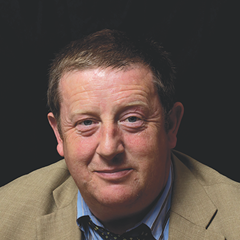Sunday Independent’s John Drennan
 Sunday Independent political columnist and journalist John Drennan tells eolas that there’s a need for a clear statement of principles on media mergers and Leinster House is still “the best private club in Ireland.”
Sunday Independent political columnist and journalist John Drennan tells eolas that there’s a need for a clear statement of principles on media mergers and Leinster House is still “the best private club in Ireland.”
Describe your education and career path.
Entirely normal until I went to St Patrick’s College, Maynooth. This was a fascinating experience because the university was in the middle of the transition from a seminary to a full-scale normal college. One could tell a few tales about the adventures of our clerical friends leaping over the walls after a night out carousing to make morning matins but the libel laws do not permit. Life in Maynooth was also interesting because the curse of productivity had not struck at that point. Was taught by some fascinating priests such as Liam Ryan and Patrick Corish. Got into a lot of trouble.
Journalism started by accident after writing a book, my first gig being the fall of Albert Reynolds.
I wandered around that week certain of my complete ignorance about what was going on and little has changed since. Or so my dear friends in Politics.ie say.
What is needed in the planned media mergers law to protect press freedom and media diversity?
Bluntly, a miracle. The nature of capitalism is to seek to create monopolies in a competitive market. It is questionable as to how much in a capitalist state governments can intervene in the market and there are many ways media owners can get around them. One supposes a clear statement of principles would be helpful but the culture of the State and a clear public policy on diversity are the most effective weapons against the creation of what Joan Burton has called a Berlusconi-style media complex.
What three political events that you have covered stand out and why?
The three political events that stood out are the Good Friday Agreement and the general elections of 2002 and 2011.
The first stood out for me personally in the sense that it was my first experience of covering a historic moment in the evolution of the State and how even days where hope rhymes with history resemble a First World War battle. If you’re asking: long periods of tedium followed by brief frenetic bouts of terror and activity.
The 2002 election also stood out because of the nature of the Fine Gael meltdown. It came as a pleasure to me in so far as I had done a series of constituency projections with Damien Kiberd some months before the event for Newstalk, where, at their conclusion I apologised for suggesting Fine Gael would only win three seats in Dublin because that could not be right. I always remember the theatre of it all and watching with fascination, and some pity, the implosion of Michael Noonan.
2011 was fascinating for similar reasons. It is, one supposes, a measure of the new ruthlessness of the Irish electorate that in two of the last three elections one or other of the old Civil War parties have been humbled whilst two small but essentially thriving political parties (the Greens and the PDs) have been simply erased from the landscape.
Again, the result was to a certain extent predestined though I take a certain pleasure from noting that the Sunday Independent from two months out predicted that the central political issue of the campaign would be whether Fine Gael would win an overall majority. In fairness, RTÉ did catch up with us on the last weekend of the campaign.
What were your reflections on Irish political culture from writing ‘Cute Hoors and Pious Protectors’?
What struck me was the strength of the influence of our colonial experience on the evolution of the State and the nature of our politics. The most worrying feature of this clientalist culture of lower grade corruption is that it remains endemic in the State, even after the dragon’s teeth it sowed have led to our current debacle.
Outside of this, the other thing I noted was the extent to which Leinster House is the best private club in Ireland. It really is, as Brian Cowen so openly admitted, a haven from the real world, a little sanctuary if you like, on the lines of Downton Abbey.
How do you like to relax?
Alcohol, in excess. Food, in excess. Blood-sports.





